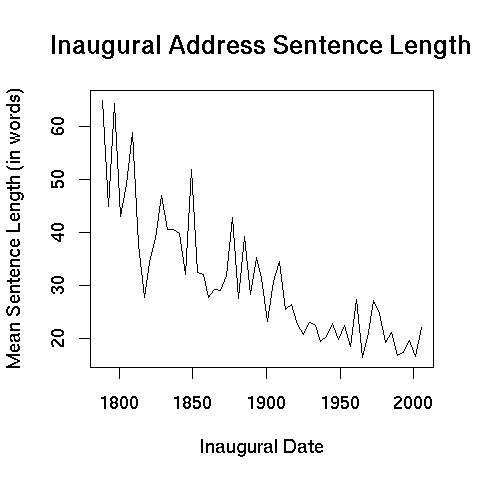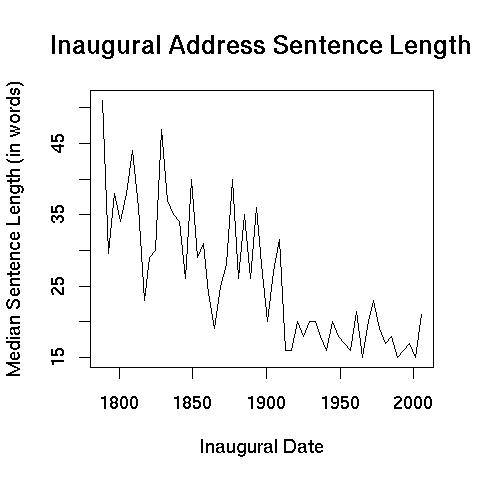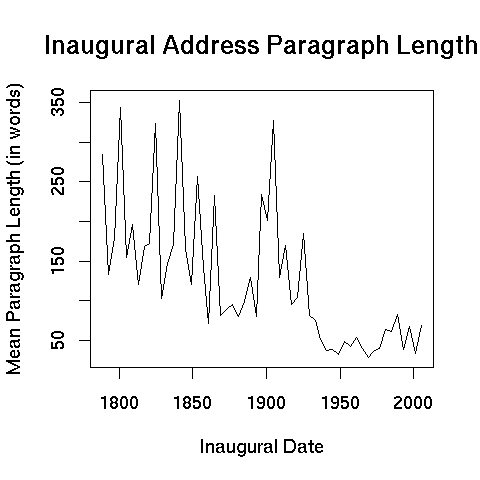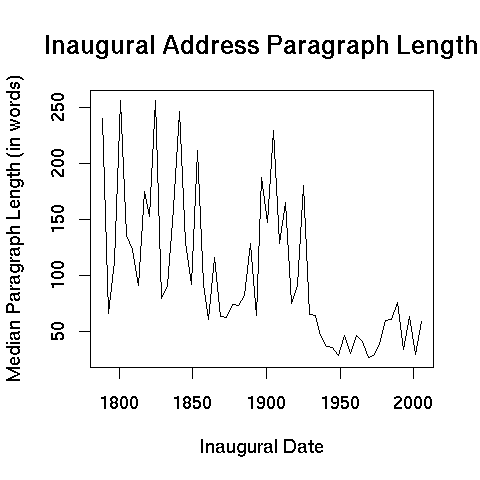September 07, 2005
Complexity
Andrew Gelman at SMC&SS has asked "Are public utterances getting more complex?" He cites Steven Johnson's observations about the increasing complexity of TV dramas, and mentions the connection to the Flynn effect of worldwide rising IQ trends:
Several years ago, Seth Roberts, who told me about all this, had the idea of measuring changes in intelligence over time by looking at the complexity of newspapers and magazines. From a casual reading of Time magazine, etc., from 1950 or so, as compared to today, Seth had the impression that the articles had become more sophisticated.
Gelman's recent post quotes an email from Roberts, who in turn cites a NYT article that quotes a passage in John McWhorter's book ("Doing Our Own Thing: The Degradation of Language and Music and Why We Should, Like, Care" ).
On p. 45, John contrasted some pro-war rhetoric from Representative Charles Eaton in 1941:
"Mr. Speaker, yesterday against the roar of Japanese cannon in Hawaii our American people heard a trumpet call; a call to unity; a call to courage; a call to determination once and for all to wipe off of the earth this accursed monster of tyranny and slavery which is casting its black shadow over the hearts and homes of every land."
with a functionally similar speech by Senator Sam Brownback in 2002:
"And if we don't go at Iraq, that our effort in the war on terrorism dwindles down into an intelligence operation. We go at Iraq and it says to countries that support terrorists, there remain six in the world that are as our definition state sponsors of terrorists, you say to those countries: we are serious about terrorism, we're serious about you not supporting terrorism on your own soil."
Gelman quotes Seth Roberts as writing
Notice that what Brownback said is considerably more conceptually complex than what Eaton said, even though the number of words is about the same.
Now, John's comment about this contrast had to mainly to do with formality rather than with complexity:
On paper we see a mess of fragments and run-ons, and a colloquial phrase like go at that congressmen in 1941 wouldn't have dreamed of using in a public statement. Actually, to give all due credit to Brownback, inflection, gesture and context made a thoroughly comprehensible speech -- not polished, but hardly of the sort that would leave you shaking your head. After all, remember the transcriptions of casual speech in the previous chapter! We can be sure that congressmen Martin and Eaton sounded at least something like them when smoking cigars after sessions. But the point is that they did not talk this way when making speeches.
As I understand John's point, it's precisely that casual speech is generally "more conceptually complex" (in some sense) than formal rhetoric is, not because its content is more elaborate, but because its presentation is more chaotic and less carefully considered.
Andrew Gelman further quotes Seth Roberts quoting Dick Hamming's observations about how informality in dress and self-presentation often led people to underestimate John Tukey, and he wonders what John McWhorter would make of all this:
Interesting thoughts. I assume this is the same John McWhorter who contributes to the cool Language Log website. I wonder what McWhorter think of Seth's comments on the complexity of public statements.
I certainly agree that there are interesting issues here, but I've gotten myself into a situation of excessive bloggish complexity, and I'll therefore refrain from trying to represent John McWhorter's views of Andrew Gelman's citation of Seth Robert's presentation of Dick Hamming's ideas about John Tukey's dress code violations.
However, I will say something about Gelman's original question "Are public utterances getting more complex?", namely that I don't know what it means. There are about a half a dozen different questions mixed up here, I think.
Are we talking about the complexity of content, or the complexity of presentation? Does the phrase "conceptual complexity" refer to a property of the concepts being communicated, or to a property of the process of communication? Are we talking about difficult ideas, or difficult language? And in the arena of presentation, are we talking about the complexity of words, of syntactic relations among words and clauses, or of semantic or rhetorical structure? Is the explicit articulation of structure more or less complex than implicit presentation of the same structure?
What do we mean by "complex", anyhow? Are we talking about some sort of information-theoretical density -- the informativeness or surprisingness of someone's choices of words, phrase structures and ideas? Or is a more elaborate structure ipso facto more complex, even if it is almost entirely predictable?
And what does all this have to do with the original focus of John's jeremiad?
I'll leave it to Seth, Andrew and John to sort these questions out. However, I do have one small contribution to make to the historical study of American political rhetoric.
The 55 presidential inaugural addresses are available in a convenient form from Bartleby. Let's compare the first two paragraphs of the first one, delivered by George Washington in 1789:
Among the vicissitudes incident to life no event could have filled me with greater anxieties than that of which the notification was transmitted by your order, and received on the 14th day of the present month. On the one hand, I was summoned by my country, whose voice I can never hear but with veneration and love, from a retreat which I had chosen with the fondest predilection, and, in my flattering hopes, with an immutable decision, as the asylum of my declining years—a retreat which was rendered every day more necessary as well as more dear to me by the addition of habit to inclination, and of frequent interruptions in my health to the gradual waste committed on it by time. On the other hand, the magnitude and difficulty of the trust to which the voice of my country called me, being sufficient to awaken in the wisest and most experienced of her citizens a distrustful scrutiny into his qualifications, could not but overwhelm with despondence one who (inheriting inferior endowments from nature and unpracticed in the duties of civil administration) ought to be peculiarly conscious of his own deficiencies. In this conflict of emotions all I dare aver is that it has been my faithful study to collect my duty from a just appreciation of every circumstance by which it might be affected. All I dare hope is that if, in executing this task, I have been too much swayed by a grateful remembrance of former instances, or by an affectionate sensibility to this transcendent proof of the confidence of my fellow-citizens, and have thence too little consulted my incapacity as well as disinclination for the weighty and untried cares before me, my error will be palliated by the motives which mislead me, and its consequences be judged by my country with some share of the partiality in which they originated.
Such being the impressions under which I have, in obedience to the public summons, repaired to the present station, it would be peculiarly improper to omit in this first official act my fervent supplications to that Almighty Being who rules over the universe, who presides in the councils of nations, and whose providential aids can supply every human defect, that His benediction may consecrate to the liberties and happiness of the people of the United States a Government instituted by themselves for these essential purposes, and may enable every instrument employed in its administration to execute with success the functions allotted to his charge. In tendering this homage to the Great Author of every public and private good, I assure myself that it expresses your sentiments not less than my own, nor those of my fellow-citizens at large less than either. No people can be bound to acknowledge and adore the Invisible Hand which conducts the affairs of men more than those of the United States. Every step by which they have advanced to the character of an independent nation seems to have been distinguished by some token of providential agency; and in the important revolution just accomplished in the system of their united government the tranquil deliberations and voluntary consent of so many distinct communities from which the event has resulted can not be compared with the means by which most governments have been established without some return of pious gratitude, along with an humble anticipation of the future blessings which the past seem to presage. These reflections, arising out of the present crisis, have forced themselves too strongly on my mind to be suppressed. You will join with me, I trust, in thinking that there are none under the influence of which the proceedings of a new and free government can more auspiciously commence.
with the first two paragraphs of the most recent one, delivered by George W. Bush in 2005:
On this day, prescribed by law and marked by ceremony, we celebrate the durable wisdom of our Constitution, and recall the deep commitments that unite our country. I am grateful for the honor of this hour, mindful of the consequential times in which we live, and determined to fulfill the oath that I have sworn and you have witnessed.
At this second gathering, our duties are defined not by the words I use, but by the history we have seen together. For a half a century, America defended our own freedom by standing watch on distant borders. After the shipwreck of communism came years of relative quiet, years of repose, years of sabbatical—and then there came a day of fire.
I don't know about complexity, but there is an obvious difference in the length of paragraphs and sentences.
Cursed as I am with the habit of quantification, I wrote a little shell script to harvest the 55 inaugural addresses, extract the texts, and measure the mean and median length of sentences and paragraphs. Here are the results in graphical form:
 |
 |
 |
 |
There's a fair amount of local variation, not to say noise, and perhaps a non-monotonic trend in rhetorical style around 1900 -- did Henry James temporarily take over from Mark Twain? Overall, though, I'll take these graphs as prima facie evidence that whatever its complexity, political rhetoric in recent decades has used shorter sentences and shorter paragraphs than in the republic's first century or so. However, I believe that whatever is going on here, it's orthogonal to John's point in Doing Our Own Thing -- recent inaugural addresses are surely at least as carefully crafted as earlier ones were. In fact, I'll bet that recent addresses would count as much more carefully structured, by measures such as composition time per sentence, number of passes of revision, amount of testing of potential audience reactions, and so on. Furthermore, I suspect that the downward trend in sentence and paragraph length over the years is partly due to this increased focus on audience uptake, along with the changes in the effective audience for such addresses caused by media changes.
[Some other relevant Language Log posts:
A tale of two media (4/30/2005)
Quit email, get smarter? (4/23/2005)
Generational changes: decline or progress? (4/20/2004)
Balm in Gilead (4/16/2004)
]